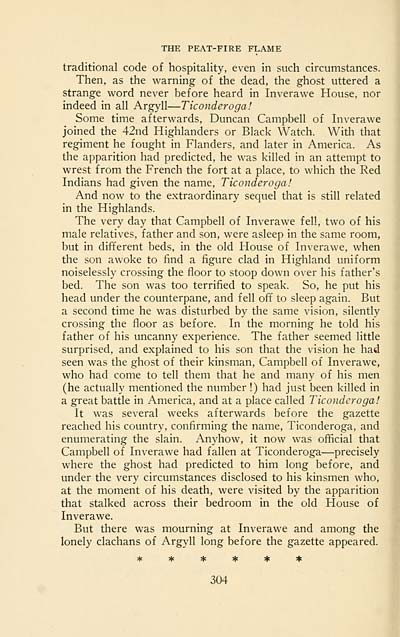Ossian Collection > Peat-fire flame
(358)
Download files
Complete book:
Individual page:
Thumbnail gallery: Grid view | List view

THE PEAT-FIRE FLAME
traditional code of hospitality, even in such circumstances.
Then, as the warning of the dead, the ghost uttered a
strange word never before heard in Inverawe House, nor
indeed in all Argyll — Ticonderoga!
Some time afterwards, Duncan Campbell of Inverawe
joined the 42nd Highlanders or Black Watch. With that
regiment he fought in Flanders, and later in America. As
the apparition had predicted, he was killed in an attempt to
wrest from the French the fort at a place, to which the Red
Indians had given the name, Ticonderoga!
And now to the extraordinary sequel that is still related
in the Highlands.
The very day that Campbell of Inverawe fell, two of his
male relatives, father and son, were asleep in the same room,
but in different beds, in the old House of Inverawe, when
the son awoke to find a figure clad in Highland uniform
noiselessly crossing the floor to stoop down over his father's
bed. The son was too terrified to speak. So, he put his
head under the counterpane, and fell off to sleep again. But
a second time he was disturbed by the same vision, silently
crossing the floor as before. In the morning he told his
father of his uncanny experience. The father seemed little
surprised, and explained to his son that the vision he had
seen was the ghost of their kinsman, Campbell of Inverawe,
who had come to tell them that he and many of his men
(he actually mentioned the number !) had just been killed in
a great battle in America, and at a place called Ticonderoga!
It was several weeks afterwards before the gazette
reached his country, confirming the name, Ticonderoga, and
enumerating the slain. Anyhow, it now was official that
Campbell of Inverawe had fallen at Ticonderoga — precisely
where the ghost had predicted to him long before, and
under the very circumstances disclosed to his kinsmen who,
at the moment of his death, were visited by the apparition
that stalked across their bedroom in the old House of
Inverawe.
But there was mourning at Inverawe and among the
lonely clachans of Argyll long before the gazette appeared.
304
traditional code of hospitality, even in such circumstances.
Then, as the warning of the dead, the ghost uttered a
strange word never before heard in Inverawe House, nor
indeed in all Argyll — Ticonderoga!
Some time afterwards, Duncan Campbell of Inverawe
joined the 42nd Highlanders or Black Watch. With that
regiment he fought in Flanders, and later in America. As
the apparition had predicted, he was killed in an attempt to
wrest from the French the fort at a place, to which the Red
Indians had given the name, Ticonderoga!
And now to the extraordinary sequel that is still related
in the Highlands.
The very day that Campbell of Inverawe fell, two of his
male relatives, father and son, were asleep in the same room,
but in different beds, in the old House of Inverawe, when
the son awoke to find a figure clad in Highland uniform
noiselessly crossing the floor to stoop down over his father's
bed. The son was too terrified to speak. So, he put his
head under the counterpane, and fell off to sleep again. But
a second time he was disturbed by the same vision, silently
crossing the floor as before. In the morning he told his
father of his uncanny experience. The father seemed little
surprised, and explained to his son that the vision he had
seen was the ghost of their kinsman, Campbell of Inverawe,
who had come to tell them that he and many of his men
(he actually mentioned the number !) had just been killed in
a great battle in America, and at a place called Ticonderoga!
It was several weeks afterwards before the gazette
reached his country, confirming the name, Ticonderoga, and
enumerating the slain. Anyhow, it now was official that
Campbell of Inverawe had fallen at Ticonderoga — precisely
where the ghost had predicted to him long before, and
under the very circumstances disclosed to his kinsmen who,
at the moment of his death, were visited by the apparition
that stalked across their bedroom in the old House of
Inverawe.
But there was mourning at Inverawe and among the
lonely clachans of Argyll long before the gazette appeared.
304
Set display mode to: Large image | Transcription
Images and transcriptions on this page, including medium image downloads, may be used under the Creative Commons Attribution 4.0 International Licence unless otherwise stated. ![]()
| Early Gaelic Book Collections > Ossian Collection > Peat-fire flame > (358) |
|---|
| Permanent URL | https://digital.nls.uk/81150355 |
|---|
| Description | Selected books from the Ossian Collection of 327 volumes, originally assembled by J. Norman Methven of Perth. Different editions and translations of James MacPherson's epic poem 'Ossian', some with a map of the 'Kingdom of Connor'. Also secondary material relating to Ossianic poetry and the Ossian controversy. |
|---|
| Description | Selected items from five 'Special and Named Printed Collections'. Includes books in Gaelic and other Celtic languages, works about the Gaels, their languages, literature, culture and history. |
|---|

